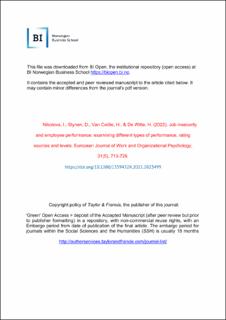Job insecurity and employee performance: examining different types of performance, rating sources and levels
Peer reviewed, Journal article
Accepted version
Permanent lenke
https://hdl.handle.net/11250/3094936Utgivelsesdato
2022Metadata
Vis full innførselSamlinger
- Scientific articles [2181]
Originalversjon
European Journal of Work and Organizational Psychology. 2022, . 10.1080/1359432X.2021.2023499Sammendrag
We examine the relationship between job insecurity (JI) and performance (i.e., adaptivity, proactivity, task performance) from a multilevel perspective. We suggest that different behavioural responses will be triggered depending on whether the JI refers to an employee’s relative JI within a team or a team’s collective JI. An individual employee’s relative JI within a team may evoke a withdrawal reaction (i.e., diminished performance) because the individual experiences the insecurity as a personal issue (one which does not affect the rest of the team as much; i.e., a “person-at-risk” situation). However, when JI is experienced as a collective phenomenon (one that affects the entire team as a whole because of the shared context, i.e., a “job-at-risk” situation), employees may demonstrate higher performance as they are driven by job preservation motives. We incorporated both individual employee and supervisor ratings as they have complementary value in evaluating performance. Data was obtained from 53 teams, including 403 employees and 53 supervisors. Team’s collective JI was associated with higher supervisor-rated performance at the team-level, both in terms of adaptivity and proactivity but not in terms of task performance. The employee’s relative JI within a team was associated with reduced self-rated performance in terms of both adaptivity and task performance. Job insecurity and employee performance: examining different types of performance, rating sources and levels

